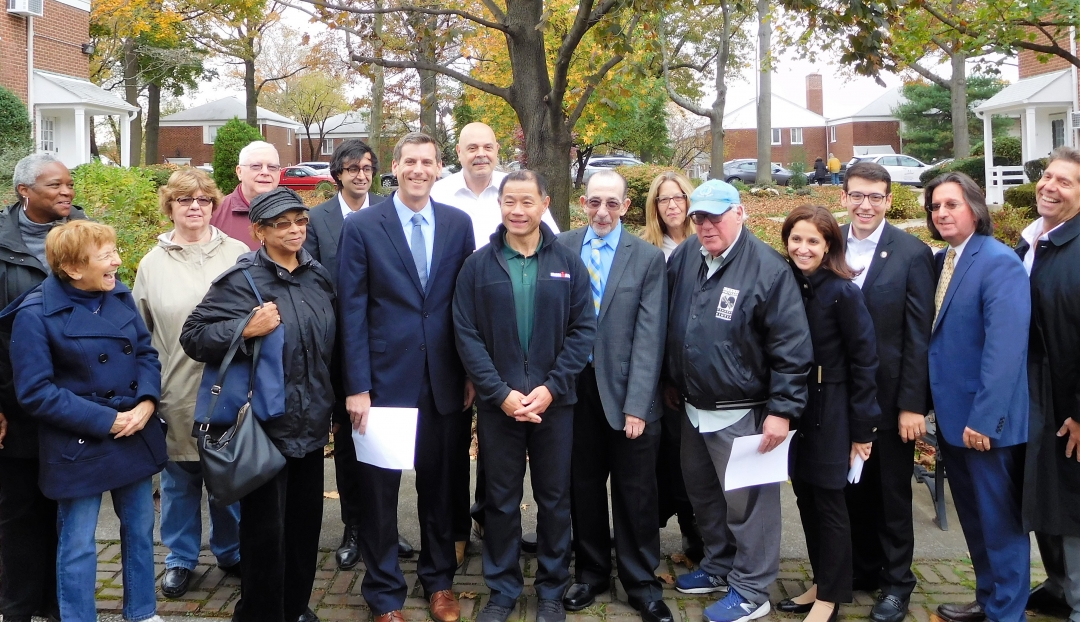Legislators and Community Leaders Announce Co-Op Clarification Bill
On November 7, 2019, Assemblyman Edward C. Braunstein (D-Bayside), Senator John Liu, Assembly Members Rosenthal and Simotas, were joined by Warren Schreiber, Co-President, Presidents Co-op & Condo Council, Bob Friedrich, Co-President, Presidents Co-op & Condo Council and President of Glen Oaks Village and community members to announce the Co-op Clarification Bill (A.8718/(S.6770).
Cooperatives are a unique form of homeownership in which purchasers buy shares in an apartment corporation. Ownership in the shares entitle the purchaser to a long-term proprietary lease to an apartment. Owners are often referred to as “tenant-shareholders” and are, in essence, simultaneously tenants and their own landlords.
Following passage of the Housing Stability and Tenant Protection Act, a historic piece of legislation meant to extend protections for renters in traditional landlord-tenant relationships, tenant-shareholders sought to make clear that provisions of new housing reforms did not apply to their unique form of homeownership. Some provisions meant to restore equity in landlord/tenant relationships stood in conflict with proprietary leases and potentially increase the costs of cooperative management.
“Despite the legislative intent that the new Housing Stability and Tenant Protection Act should only apply to landlord/tenant relationships, there is concern that some provisions could potentially be interpreted as applying to proprietary leases,” Said Assemblyman Braunstein. “To clear up any confusion, Senator Liu and I introduced this legislation to clarify that the new rent laws do not apply to co-ops and condos.”
“The Tenant Protection Act, which extends important protections to tenants, was not meant for tenant-shareholders,” Said Senator John Liu. “I represent a district with one of the largest concentrations of co-ops. The dynamics of co-op ownership cannot be compared to the landlord/tenant relationship on which the housing laws were based.”
"The Housing Stability and Tenant Protection Act was a monumental step toward a fairer housing market in New York State," Said Senator Leroy Comrie. "But it's become clear since its passage that certain provisions may have the unintended consequence of unduly burdening co-op boards and individual co-op shareholders, undermining the spirit of the HSTPA."
“Living in your own condo or co-op is not the same as being a tenant in another person’s building, and it’s important that the law is explicit in that distinction,” Said Senator Anna M. Kaplan. “I’m proud to be a co-sponsor of the legislation so that my residents won’t face any legal confusion or unnecessary expense.”
“Since we passed historic new tenant protections in Albany this year, there has been some concern and confusion among cooperative shareholders, boards and management companies about how the new laws affect them,” Said Senator Liz Krueger. “This bill recognizes the many ways in which cooperative buildings are unique from rentals, and should be treated as such under the law.”
"I am pleased to co-sponsor S6770 which makes important clarifications in the rent reform laws we enacted in June,” Said Senator Shelley Mayer. “The Housing Stability and Tenant Protection Act of 2019 was significant legislation to increase tenant protections, and particularly for rental tenants. Having met with representatives of cooperatives, I recognize that the application of some of the law's provisions to cooperative apartments may have not been clear."
“I was a supporter of the landmark Tenants Protection Act enacted earlier this year,” Said Senator Toby Stavisky. “I hope S6770 will clarify the language of the Protection Act so that the cooperative and its shareholders are protected, as well as the leasee."
"Earlier this year, the legislature took bold steps to ensure that millions of tenants across the state have stronger protections against unscrupulous intentions," said Assemblymember Daniel Rosenthal. “This bill serves to clarify language for owners of co-op apartments so that they don't face unintended consequences."
"The Housing Stability and Tenant Protection Act that passed this year was intended to protect tenants from landlords who harass and abuse their power,” Said Assemblymember Aravella Simotas. "Unfortunately, portions of the Act were vague and have inadvertently caused a headache for co-op owners. I proudly support my colleagues’ bill to resolve any ambiguities and clarify the law as it pertains to co-ops.”
“The historic Housing Stability and Tenant Protection Act, which was signed into law in June, confers landmark protections to renters in our state but adversely effects tenant-shareholders who reside in co-ops and are both tenants and owners. The Co-op Clarification Bill will remedy the ambiguity in the new law to make sure that tenant-shareholders, many of whom are middle class families and retirees, aren’t negatively impacted,” Said Assemblyman David I. Weprin. “I look forward to joining my colleagues to fight for the passage of this bill in the Assembly and Senate.”
"Our co-ops exist as some of the final remaining affordable, middle class housing options in New York City,” Said Council Member Paul Vallone. “While the Housing Stability and Tenant Protection Act of 2019 made important strides to shield New York State's millions of tenants from unfair practices, these newly enacted measures have established rules that put the financial viability of our co-op communities at risk.”
“Cooperative ownership in NYC represents one of the last bastions of affordable housing for middle income New Yorkers,” Said Warren Schreiber, Co-president, Presidents Co-op & Condo Council. “Certain provisions of the Housing Stability and Tenant Protection Act of 2019 make it difficult for co-ops to operate efficiently while continuing to provide shareholders with a comfortable, safe and affordable place to live. In order to maintain a high quality of life for all residents, co-ops must be exempt from the prohibitive requirements of the Housing Stability and Tenant Protection Act of 2019.”
“Glen Oaks Village is the largest garden apartment co-op in NY with 3,000 families. It is important that we and other co-ops protect our financial integrity for the sake of the shareholder- owners that live there,” Said Bob Friedrich, President of Glen Oaks Village. “The Housing Stability and Tenant Protection Act of 2019 was probably never intended to apply to co-ops but rather to commercial rental properties where classic landlord/tenant relationships exist, as it does not distinguish between profit generating commercial rental entities and non-profit residential co-ops.”
“Although well-intentioned, the Tenant Protection Act has no application in the co-op community,” Said Geoff Mazel, Esq. “This proposed legislation provides much-needed clarification for co-ops within the Tenant Protection Act.”

